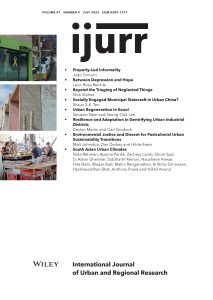Recent urban scholarship shows how zoning and real estate dynamics shape ongoing processes of gentrification and deindustrialization. While studies demonstrate the impact of planning and property market pressures on the arts, less research has examined their effect on urban manufacturers in gentrifying industrial districts. Given the differential impact of zoning and real estate pressures, our research focuses specifically on how ‘cultural manufacturers’ negotiate changing land use patterns in gentrifying urban industrial areas in San Francisco and Melbourne. Our findings show how cultural manufacturers develop flexible workspace arrangements, business models and professional networks to negotiate urban restructuring and avoid displacement. Though innovative, these survival strategies provide limited ability to navigate structural barriers. Here, the presence of intermediary organizations can help coordinate a strategic response to industrial gentrification and indifferent planning policy. In our research we highlight the everyday practices of adaptation and collective action in an under-researched cultural sector to provide a counterweight to macro-scale transitional narratives. While cities have deindustrialized owing to technological and competitive pressures, to focus exclusively on this misses a range of resilience practices that have sustained manufacturers in restructuring cities.
Details
Written by:
Declan Martin & Carl Grodach
Digital Object Identifier (DOI)
10.1111/1468-2427.13175
About DOI

